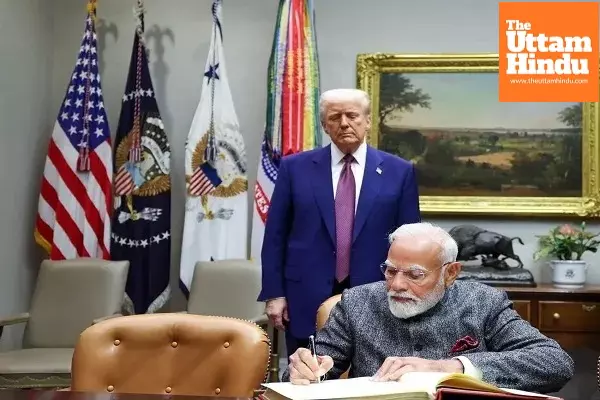America Risks Losing India as Strategic Partner, Former US Officials Warn Trump’s Tariff Policies Could Push New Delhi Toward China

New Delhi/Washington (The Uttam Hindu): Relations between India and the United States have entered a tense and uncertain phase, with former senior American officials warning that Washington risks losing one of its most crucial strategic partners if current policies continue.
In a joint editorial published in Foreign Affairs, former National Security Advisor Jake Sullivan and former Deputy Secretary of State Kurt M. Campbell cautioned that President Donald Trump’s tariff-heavy approach and shifting alliances could undermine decades of bipartisan effort to build a strong India-US partnership. They stressed that such a breakdown would give China an opening to outpace democratic nations in innovation and global influence.
The editorial pointed to Trump administration policies — including import tariffs of up to 50% on Indian goods, objections to India’s purchase of Russian oil, and warmer ties with Pakistan — as major setbacks. They highlighted Prime Minister Narendra Modi’s meetings with Chinese President Xi Jinping and Russian President Vladimir Putin at the SCO summit as signs that India may be edging closer to US rivals.
Sullivan and Campbell argued that comparing India with Pakistan is a strategic blunder, noting that while Washington’s interests in Pakistan remain narrow (terrorism and nuclear security), its long-term interests with India are wide-ranging and vital. They also criticized Trump’s claim of credit for India-Pakistan ceasefire talks and the White House’s warm welcome to Pakistan Army Chief Asim Munir, followed by trade and economic assurances to Islamabad.
To restore confidence, the former officials proposed that the US pursue a formal strategic partnership with India, endorsed by the US Senate and anchored on five pillars: security, prosperity, innovation, democratic values, and global leadership. They further recommended a 10-year joint action plan focusing on critical technologies such as artificial intelligence, semiconductors, biotechnology, quantum technologies, clean energy, telecommunications, and aerospace.
The article urged both nations to develop a shared technology ecosystem under a “Promote and Protect” agenda, combining R&D investment, talent exchange, export controls, and cyber security measures to ensure democracies are not left behind in the innovation race against authoritarian powers.
The warning was stark: If the US fails to adjust its approach, it will not just lose a trade partner, but a strategic ally — and China will be the biggest winner.
